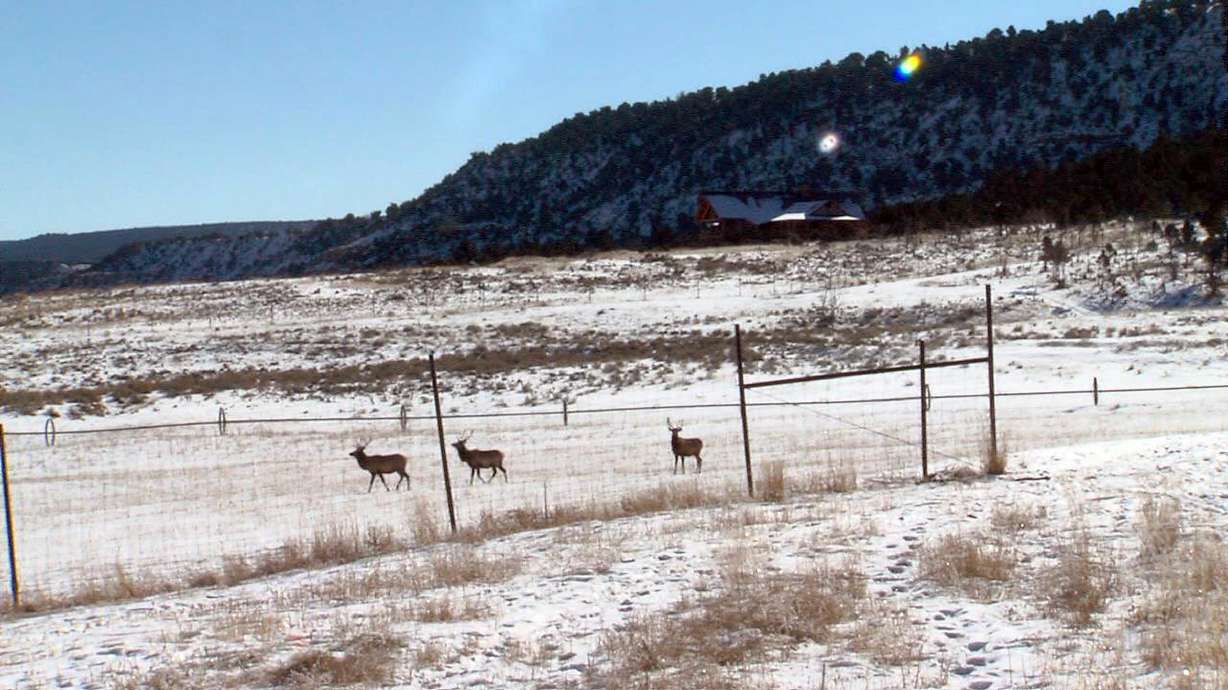Estimated read time: 5-6 minutes
This archived news story is available only for your personal, non-commercial use. Information in the story may be outdated or superseded by additional information. Reading or replaying the story in its archived form does not constitute a republication of the story.
FORT DUCHESNE, Uintah County — The Ute Indian Tribe of the Uintah and Ouray Reservation says the state's motions to dismiss its lawsuit regarding the sale of Tabby Mountain are part of ongoing racism and discrimination against the tribe.
The Ute Indian Tribe sued a number of state agencies and officials in May, arguing that they had conspired to prevent the tribe from purchasing Tabby Mountain, 28,500-acres of state trust land just outside its reservation.
The defendants moved to dismiss the suit in August, arguing the state was well within its rights to suspend the sale of Tabby Mountain, that the tribe is not eligible to sue under federal civil rights laws and that it didn't meet the statute of limitations. The lawsuit named the Utah School and Institutional Trust Land Administration; its former and current directors David Ure and Michelle McConkie, respectively; former Department of Natural Resources Director Mike Styler and Utah Gov. Spencer Cox as defendants.
The Utah School and Institutional Trust Land Administration, which manages state trust lands to fund Utah public schools, put Tabby Mountain up for sale in 2018. The Ute Indian Tribe outbid the only other bidder, the Utah Department of Natural Resources, by $6 million. The department disclosed that it did not have the resources for its bid, and the administration later suspended the auction indefinitely instead of selling to the tribe.
The lawsuit, which follows media reports of a whistleblower complaint, claims the two state agencies rigged the bidding process to keep the land out of the tribe's hands. The Ute Indian Tribe now seeks a court order directing the state to sell the property to the tribe and pay for damages.
"Indeed, the tribe was tricked, all according to defendants' plan," the Ute Indian Tribe argues in court documents. "Defendants McConkie and SITLA cannot now argue that the reason the tribe's civil rights claims are time-barred is because the defendants' conspiracy was so convincing — that it worked. To allow that argument is to allow a civil rights violation to succeed based on the wits of the government actors and entities holding the marionette strings; based on how well they trick an audience observing through a limited and obstructed view."
Some of the defendants claimed they should not be defendants in the suit since the responsibility for the sales of trust land administration properties falls on that agency and its director. The Ute Indian Tribe offered a blistering response to those arguments, arguing that all the defendants held responsibility for what it says is ongoing discrimination to date.
"It is, in fact, disappointing that the governor of a state would know about blatant discrimination in sale of property, against a tribe in his own state, and instead of telling his subordinates to complete the sale as he should have, he has his attorneys seek to continue the wrongful discrimination," court documents read. "Most notably, defendant Cox attempts to escape liability for his ongoing failure to exercise his power to remedy the ongoing wrong, attempting to hide behind a claim that it happened on someone else's watch. It is happening on his watch. He can do something about it, but instead is having his attorneys try to evade the consequences of the ongoing discrimination."
Likewise, the tribe's response criticized McConkie's motion to dismiss, pointing to the fact that the land administration has yet to resume the bid to Tabby Mountain. McConkie replaced Ure as the Utah School and Institutional Trust Land Administration director in 2022.
"If director McConkie had stopped the ongoing discrimination when she took office, perhaps she would have had an argument. But she cannot both support the ongoing discrimination and claim she cannot be sued," court documents state. "It is disappointing that, instead of reviewing the tribe's complaint and deciding to remedy the ongoing wrongful discrimination by her agency and the wrongful breach of trust responsibilities to trust beneficiaries, defendant McConkie chooses to affirmatively act to continue the wrongful discrimination."
The tribe also stressed that the Tabby bid took place within a broader historical context of land being systemically stripped from the tribe. Tabby Mountain itself is among the tribe's ancestral homelands and was named after Chief Tabby-To-Kwanah, who led the Timpanogos Nation when they were forcibly displaced from Utah Valley to the Uintah and Ouray Reservation in the 1800s.
That backdrop "highlights the extraordinary injustice of government actors first taking land from the tribe, putting the stolen land up for auction and then rejecting the tribe's bid as the highest bidder on the very land that was stolen. These factual allegations are just the start of the tribe's showing that the defendants' actions cannot be evaluated as anything but intentional continuation of this discriminatory historical backdrop into the modern day," court documents read.
"The tribe lost something even beyond and in addition to monetary damages as a result of the conspiratorial scheme to deprive it of its aboriginal homelands," the tribe argues. "It lost the irreplaceable opportunity to practice its religious and spiritual beliefs at Tabby Mountain, to hunt, forage, and collect natural resources, and the unique realty itself. It lost the opportunity to unite the mineral estate — which it owns — with the surface estate, which it fairly purchased — but for the defendants' racist scheme to prevent that reunification. It also lost the opportunity to add a parcel of land — teeming with life — to its communally held resources, held in trust by the United States and designed to benefit all tribal members equally."










